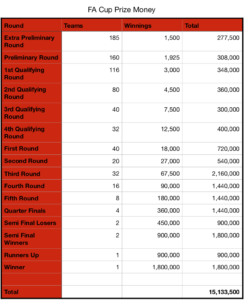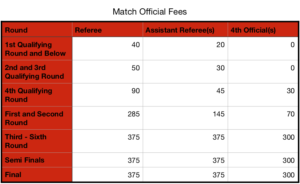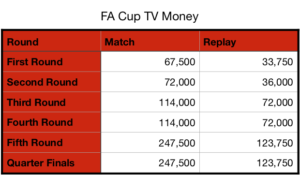With the Third Round of the FA Cup kicking off tonight with the blockbuster tie Liverpool v.s. Everton, we will analyse the prize money and gate receipts to be earned by clubs in this years FA Cup and show how much small teams can benefit from this.
The gate receipts earned by clubs will be posted in our Matchday Money Article on the conclusion of all the FA Cup games each week.
Prize Money

The winner of in each tie of each round will receive a win bonus for their success. In total, the FA pay out over £15m to clubs competing in the FA Cup, which is paid out of a pool from from gate receipts that we will look at in more detail later.
As you can see, a run to the final starting from the FA Cup Third Round will net a club nearly £5m, not taking into account the additional gate receipts received.
The importance of the FA Cup to clubs has fallen due to the growing importance of the more lucrative Premier League and Champions League competitions, which yield much higher revenues for competing in them. £5m to the clubs near the top of the Premier League and maybe even lower is just a drop in the ocean and while nice, it pales in comparison to the riches offered in other competitions.
Gate Receipts
Gate receipts are the ticket sales for any given match, usually these go to the home team however in the FA Cup they are split as we will detail below. The amount split is the net gate receipts, this is the gate receipts less expenses. In addition around 15% of matchday tickets are allocated to the away team for FA Cup games.
Ticket Prices
The ticket prices for FA Cup games are indicated by the Football Association with recommended prices for each round, these can be deviated from if both clubs agree to a certain price. The recommended prices are as followed:
Round 3 – 6 : £15
Round 1 and 2 : £10
4th Qualifying Round : £6
2nd and 3rd Qualifying Round : £5
1st Qualifying Round and below : £3
Around 15% of all tickets should be allocated to the away team, this can deviate from this if both clubs agree or due to safety concerns.
Expenses
The expenses that are deducted include all expenses necessary for the game to take place.
Vital for a game to take place, referees take up the majority of expenses, with travel, food and match fees all required.
Travel expenses include the cheapest railway fare available on the day or 40p per mile if travelling by car. Should an overnight stay be required, a maximum of £100 can be expensed for their stay. A meal allowance is allowed if travel exceeds 4 hours (£15), 6 hours (£20) or 8 hours (£25).

Match official fees are also an expense, these cause more of an issue for lowly team in the first few rounds where the expense, despite small, is more of a burden than a couple thousand pounds for professional clubs.
The match official fees never go any higher than in the third round, meaning success is not penalised with further expenses in respect of refereeing costs.
The away team’s expenses are also deducted to get to the net gate receipts, with the following fees deductible:
Travel
- £3 per coach mile (£6 where overnight stay is required)
- 40p per mile for up to 5 cars
- 25 cheapest train tickets
Hotels – £100 per person for up to 25 people
Medical costs
The expenses on the day also include Floodlights (£100) and policing costs.
These costs are all minimal for bigger clubs and become relatively minuscule the further into the competition clubs get compares to the winnings on offer.
Now we know how the net gate receipts are calculated, we will analyse how this income is split between clubs.
How Gate Receipts Are Split
So net gate receipts are split equally in most situations to greater benefit of smaller teams, who in one blockbuster game can make more than they do in an entire season.
Before we move on, the FA, to pay the prize money for the competition, extract a fee from each game’s gate receipts. This amount is known as the ‘pool’ and is taken from each game, starting in the third round.
Another amount is taken, 5% of all replays, which is split between all non-football league team clubs paying in the first round, something which can be quite lucrative to these teams.
Up to the FA Cup Third Round, net gate receipts are split evenly between the competing teams with no amount taken to contribute to the pool, however the 5% if matches are taken to a replay is taken, which would leave both clubs with 47.5% of net gate receipts.
For the Third to sixth rounds of the FA Cup, 10% is taken from net gate receipts and added to the pool, leaving both clubs with 45% of net gate receipts (42.5% for replays).
However, where one of the clubs is outside the football league, that club get 50%, the other club 40%, with 10% still going to the pool (47.5% and 37.5% for replays, with 10% still going to the pool)
In the FA Cup Semi Final, 5.5% of the net gate receipts fees is given directly to the FA, for distribution to affiliated associations at their discretion. A payment is also made to the stadium owner where the match is played (currently Wembley). Of the remainder, after payment to the stadium provider:
- 25% is given to the FA;
- 65% is to be shared between clubs (32.5% each); and
- 10% goes to the pool.
In the big one, the FA Cup Final, 5.5% is given once again to the FA for distribution to affiliated associations and a payment is also made to the stadium providers. Of the remainder, 90% is given to the FA and 10% is given to the pool.
TV Money

FA Cup TV revenue can be a real money spinner for the lucky few that are chosen for broadcasting. Up until and including the FA Cup Fifth Round, the amount of money for those broadcasted is more than the amount given for winning the match! Losing a televised First Round match is more lucrative than winning a First and Second Round non-televised match in terms of match winnings alone.
I hope you have enjoyed this article. Stay tuned for the Matchday Money article for Gameweek 22 as well as a tracker for FA Cup prize money for all Premier League games.

